Abstract
The article states the idea that the sustainable development of Russian society is directly related to the active civic stance of the younger generation. At the same time, it is noted that the social activity of young people is manifested in various forms (positive, neutral, negative), each of which is characterized by a certain level of development of legal awareness. The authors note that the vector of social development depends largely on the level of development of legal consciousness. The article presents an analysis of the attitude of Far Eastern students to law and its various manifestations on the example of materials from a regional empirical study. By means of an online survey of 200 respondents (students of Far Eastern universities), the authors obtained results suggesting that infantilism, manipulativeness, and consumerism are inherent in the legal consciousness of young people. These traits can become a dangerous tool in the hands of socially destructive groups (including in the virtual space). In this regard, it is necessary to provide legal education of modern youth in new forms, taking into account new realities and digital technologies. The sustainability of the development of Russian society depends, among other things, on how successful and effective the process of forming the legal culture and legal consciousness of modern youth will be.
Keywords: Legal awareness, Russian society, youth, sustainable development of society
Introduction
Sustainable development of society in the context of official strategic documents is associated with global environmental problems of our time in the first place. At the same time, the key to the concept of “sustainable development” is such an understanding of development that meets the needs of the present and does not jeopardize the ability of future generations to meet their needs. In this case, we are talking about not only ecological, but also socio-cultural sphere of the life of society.
Human capital is one of the main prerequisites for sustainable development of society. Young people with their system of values and social guidelines form the basis of human capital. The attitude of modern youth to the traditions of Russian culture, milestones of history, Russian spirituality and the normative order of social life is increasingly characterized as nihilistic, critical and generally negative. In terms of the attitude of young people to social reality, the most indicative is the level of their legal awareness and culture.
The formation of appropriate legal awareness of citizens is an important task of a civilized society. The vector of social development largely depends on the level of development of legal awareness. Modern youth is the social resource which determines the future of Russian society. A decent level of legal culture and awareness of Russian youth is the key to the successful establishment of the rule of law and civil society in Russia.
Problem Statement
The problem of legal awareness is quite traditional for social science. It is currently acquiring an interdisciplinary nature, being the subject of research in the theory of law, philosophy of law, sociology, political science and social psychology. The heuristic potential of these social sciences and humanities in the study of the phenomenon of legal awareness lies in the fact that their toolkit makes it possible to identify the specifics of various manifestations of legal awareness in the course of the social activity of citizens.
Social activity can be characterized as the actions of social actors aimed at changing the quality and conditions of life. The influence of various philosophical attitudes determines the nature and form of social activity. In modern studies on the social activity of young people, it is noted that “the regulator of the social activity of young people, its intensity and focus are semantic ideas about reality” (Zubok & Berezutskiy, 2020, p. 89). Studies by I. Trofimova confirm that for young people, the main motive for social participation is adherence to ideals, the desire to make the world a better place (Trofimova, 2015).
At the same time, in our opinion, the social activity of modern youth can be represented by three main forms:
- positive (volunteering, participation in socially oriented projects, etc.);
- neutral (training, leisure activities, Internet communications, etc.);
- negative (illegal behaviour, protest activity, destructive activity in the virtual space, e.g. cyberbullying, sexting, etc.).
The first form is characterized in modern conditions by very diverse forms of voluntary participation of young people in socially significant projects. Today, many researchers are studying various aspects of volunteering (Khvorostianova, 2017; Mersianova et al., 2019; Pevnaya, 2016; Vavilina et al., 2021). An active civic stance, adherence to the principles of solidarity, social justice, readiness for mutual support and a positive attitude towards the normative regulators of society can be considered main things here. Young people who show their activity through participation in socially oriented projects are distinguished by a high level of legal awareness and culture.
The second form can be conditionally attributed to active social action, since young people often choose their place of study not on their own, but at the behest of their parents. In such cases, training, for example, can occur in a rather passive form for the student. However, for justice’s sake, it should be noted that educational organizations most often create decent conditions for students to release not only intellectual, but also creative and other potential. Internet communications that do not pursue a specific socio-political or other activist goal, implemented primarily as communications of interest, as well as in the form of computer games, do not have a significant impact on the legal culture of users, unless they are associated with illegal virtual behavior. It is difficult to characterize the legal awareness of young people; it can have high, average or low level.
As for the third form of social activity, since it is based on legal nihilism, all of its manifestations are directly related to the violation of norms established in society, which indicates a low level of legal awareness and social and legal responsibility. Jurists, sociologists and psychologists have long and productively studied the issues of illegal activities of young people. However, it is sociological and socio-psychological methods that are most effectively used in criminology, criminalistics, criminal law and process in the study of unlawful deviations in the information and communication space. Since virtual socialization is currently essential for the development of personality, the study of its multidirectional forms (both positive and negative) is very important and timely (Bogacheva, 2016; Kozyreva & Zverkova, 2017; Shapovalova, 2015; Varaksin, 2016). The appeal to destructive forms of behavior of young people in the virtual space is currently especially relevant in the light of widespread digitalization and informatization (Bochaver et al., 2019; Cherenkov, 2015; Sharov, 2019; Vaisburg, 2019).
Based on the above, we can confidently assert that the problem of legal awareness of modern youth in the aspect of the formation of sustainable development of Russian society is urgent and requires research attention.
Research Questions
During the study, the following questions were addressed:
- How does the socio-cultural crisis of Russian society influence the legal awareness of modern youth?
- What legal values are most significant for today's youth?
- What are the main trends and prospects of legal awareness and culture of modern youth in the context of sustainable development of Russian youth?
Purpose of the Study
The purpose of the study was to clarify the attitude of modern student youth to law and its various manifestations, to establish the main characteristic features of the legal awareness of Russian youth and to determine trends in the development of legal awareness and culture of young Russians in the context of sustainable development of Russian society.
Research Methods
The purpose of the study was to clarify the attitude of modern student youth to law and its various manifestations, to establish the main characteristic features of the legal awareness of Russian youth and to determine trends in the development of legal awareness and culture of young Russians in the context of sustainable development of Russian society. The main research method was a questionnaire survey. In January-February 2021, we conducted a pilot study on the state of legal awareness of student youth (aged 17 to 35) in the Russian Far East. The sample consisted of 200 respondents. Through an online survey of students of various specialties of Far Eastern universities, we obtained the empirical material, the analysis of which made it possible to draw a number of preliminary conclusions. In our opinion, it is reasonable to study the opinion of student youth on issues of attitudes towards law, because this is the most socially active, intellectual, conscious part of the younger generation. Extrapolating the obtained results to all Russian youth should be done with a certain degree of caution due to the specifics of the geographic, socio-demographic, historical, cultural and other conditions for the development of the region. The survey involved young people aged 17-20 years (38%), 21-25 years (29%), 26-30 years (18%) and 31-35 years (15%). The first questions concerned the overall assessment of the level and structure of the culture of Russian society. The opinion that legal culture is part of the culture of society as a whole was shared by the overwhelming majority of the respondents (completely agree - 54.5%, somewhat agree - 28.5%). Answering the question “Can it be said that the level of Russian culture in the 21st century has become much lower than it was in the 20th?” most of the respondents gave a positive answer (completely agree - 31.5%; somewhat agree - 43%). Only 2% of respondents completely deny this fact, and 16.5% are hesitant (somewhat disagree). 7% of respondents found it difficult to answer the question (Figure 1).
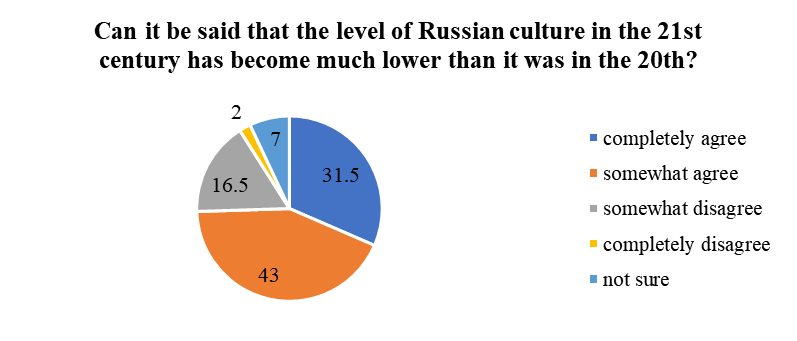
The state of culture affects the moral and ethical sphere of society in the first place. The respondents were asked the question “Can it be said that the Russian society is experiencing a spiritual and moral crisis?” The answers are presented in Figure 2.
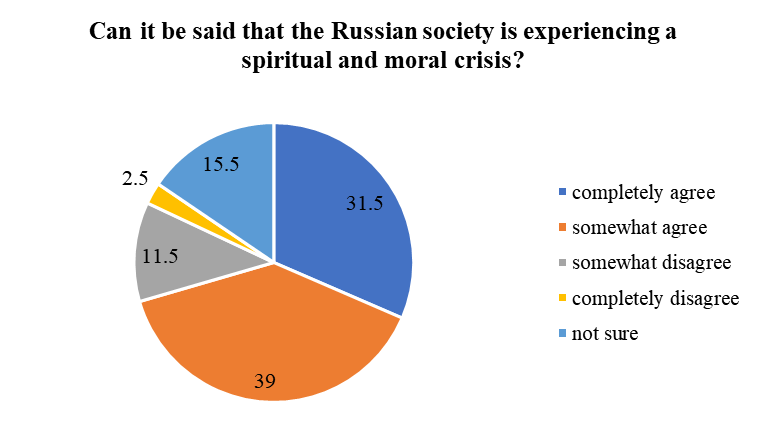
Answers to the question “In your opinion, does Westernization (the spread of the values of Western civilization) affect the level of Russian legal culture?” were distributed as follows: definitely affects - 32%; rather affects - 45%; rather does not affect - 9%; definitely does not affect - 4.5%, 9.5% found it difficult to answer. The overwhelming majority of young people surveyed understand that the wide spread of Western culture, the imposition of Western values cannot but affect the formation of legal awareness and culture of Russian youth.
The question “Do you think the widespread dissemination of information and communication technologies can have a negative impact on the formation of a legal culture?” showed the conflicting opinions of young people: “yes, I think it can have a negative impact” - 35.5%; “No, I think this does not affect the legal culture in any way” - 43%, 20.5% found it difficult to answer.
Since this question offered the option to provide their own answers, another 0.9% responded, “on the contrary, I think it has a beneficial effect on the formation of the legal culture of society” and “I believe that the spread of information and communication technologies rather has a positive effect on the formation of legal culture”. It can be noted that young people, since they constantly use information and communication technologies in their daily lives, are more inclined to their positive impact on culture in general and legal culture in particular.
We also tried to figure out the influence of the virtual space on legal culture and awareness by means of such a question “Have you personally encountered cases of using the Internet space for illegal purposes?”. The answers to this question were distributed as follows (Figure 3).
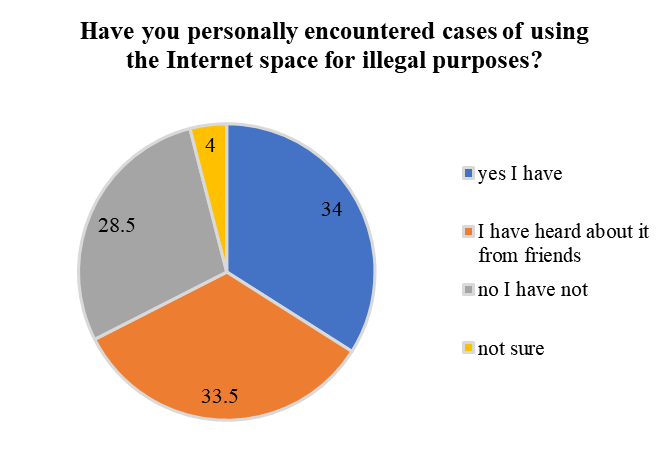
The statement of the fact that there are cases of illegal use of the Internet space does not yet speak of its negative role in the formation of legal awareness and culture, but it makes one think about such possibilities.
As a follow up, the next question was “Do you think the state should restrict access to Internet resources based on the age of users in order to protect adolescents from the negative influence of the so-called “free information”?” The answers are presented in Figure 4.
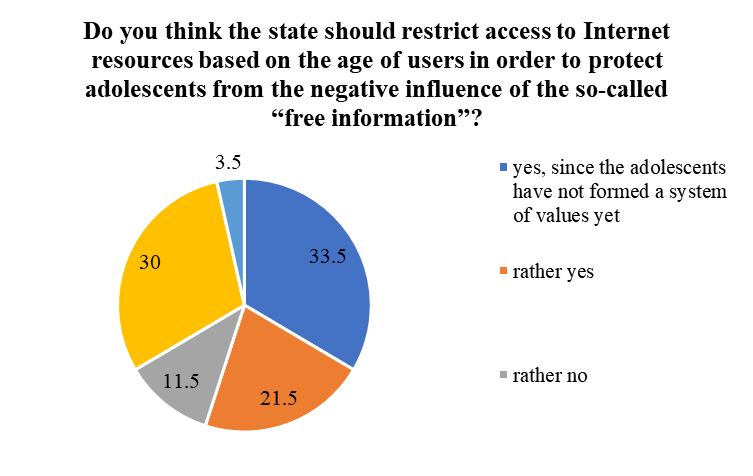
For the most part, freedom-loving youth do not accept the policy of restrictions, but in this case, opinions were divided approximately equally. It is obvious that common sense speaks of the need to limit the unstable adolescent psyche from possible negative influences from the uncontrolled Internet space.
The Internet space allows young people to not only communicate and download the necessary information, but also to view various content, including watching movies, etc. The students were asked the question “Can it be said that modern foreign cinema is capable of having a destructive effect on the general level of legal awareness of Russian citizens?” The following responses were received (Figure 5).
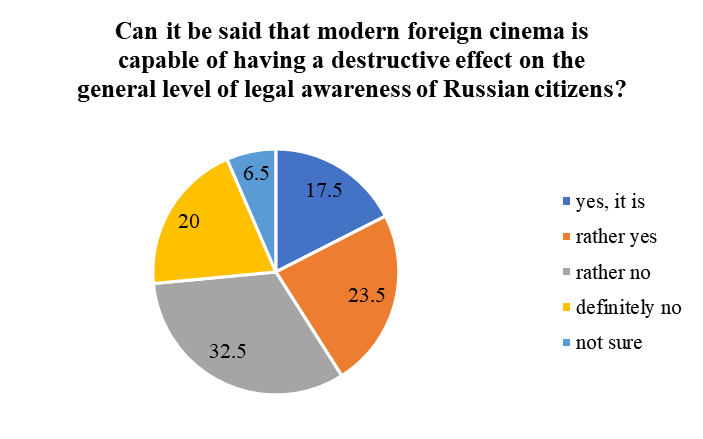
Most young people tend to believe that foreign cinema does not have a negative impact on Russian culture. At the same time, a large part of the respondents still sees foreign cinema as a danger to the Russian legal awareness.
In order to clarify the understanding of the essence of legal regulation, the respondents were asked to answer the question “Is it correct to believe that “right” means, “I do what I want”?” The answers showed that young people assess the purpose of law and rights in society quite adequately. The option “No, right is a measure of freedom and is associated with the fulfillment of certain rules in the course of exercising freedom” was chosen by 94.5%; 0.5% of respondents chose “no”. Only 5% provided a positive answer to this question.
The answers to the question “Is it always necessary to obey the law?” were as follows: 44% of the respondents chose “yes, it is, that's what the law is for”; 30% answered “rather yes”; 13% said “not always, since laws are often unfair”; 7% found it difficult to answer. Since the question included the free text field, the others offered their own answers: “You should obey it, but you have to appeal in case of disagreement”; “Not always, but laws are often fair”; “The law is written in blood. We must obey it. But in very rare cases, such as saving a life, it can be violated”; “As long as the law is recognized by citizens”; "If this a law, everyone must to obey it at all times, but in our time, the authorities write the laws as they please, in their own interests."
One of the legal values is the principle of justice. The respondents were asked to answer the question “Justice is understood as such a principle of coexistence of people, in accordance with which everyone should act proceeding not from their own selfish interests, but guided by a sense of duty. Are you ready to live by the principle of justice?” The majority of respondents, which is 55%, expressed their readiness to comply with this principle; 41% of the respondents considered this principle to be relative and answered “I don’t know, everything depends on the situation”; 2.5% indicated “no, my own interests are more important” (Figure 6).
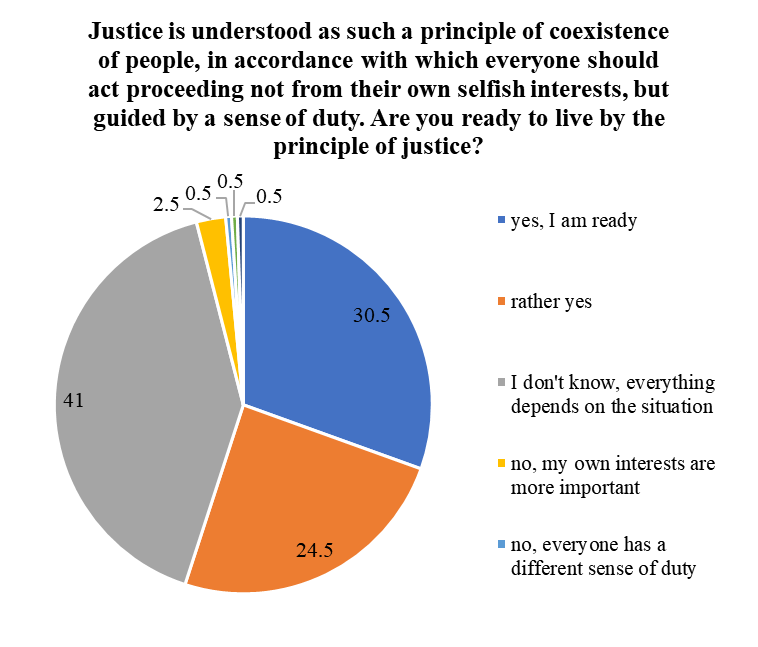
In addition, the respondents provided their own answers in the free text field: “I choose to live by the norms of morality”; “as long as capitalism will change for socialism in the Russian Federation”; “No, everyone has a different sense of duty.”
Findings
In the final question, the respondents were asked to express their opinion on what poses the greatest threat to the development of Russian society nowadays. The systematization allowed us to group the answers as follows:
- the first group characterizes the attitude towards the state of Russian society (“lack of spirituality and education”; “values of Western civilization transmitted through social networks”; “degradation”; “immorality accepted as the norm”; “depravity”; “decrease in the standards of spiritual and moral behaviour in society”; “poor education, ignorance of the history of the state”; “lack of spirituality and poor upbringing”; “unemployment, poverty, illiteracy, a lot that can pose a threat: environmental problems, confrontation between countries, information wars”; “propaganda of the destruction of families. Radical feminism. Misogyny. People do not appreciate each other and insult everyone easily”; “citizens' indifference to each other”, etc.);
- the second group of answers concerned the attitude of citizens towards the government and the assessment of the current government in general (“indifference of the government to citizens”; “corruption at all levels of government”; “admission of incompetent specialists to power”; “current government”; “corruption of officials, unqualified personnel, sale of state property, mineral resources and national property”; “lack of the ability of the people to engage in solving vital issues in the country, as well as the lack of opportunities to get a good education”, etc.);
- the third group of answers concerns the attitude towards the law (“legal nihilism, which in turn gives rise to a feeling of permissiveness. It is necessary to teach society to live in the legal field more rigidly”; “corruption, the judicial system and elections”; “corruption, violation of the law by those who should enforce it, impunity due to system imperfection”; “unfair courts, corruption”; “drug addiction, Internet fraudsters”; “bad habits, corruption and injustice”; “laws that are directed against people and do not benefit them” etc.)
- the fourth group of answers characterizes the attitude of respondents towards information and communication technologies and the media (some answers simply indicated “mass media” or “Internet” as a threat to the development of Russian society; along with this, the following answers were given: “uncontrolled access of young people to destructive, false information which completely “brainwashes” them, replacing real values with imaginary ones”; “negative influence of the Internet, “voluntarily and compulsorily””; “too rapid development of social networks”; “access to the Internet from infancy”; “inability to use available information correctly”, etc).
The results of the study suggest that the socio-cultural crisis of Russian society has a significant impact on the legal awareness of modern youth. The crisis of the socio-economic system, the loss of the system of traditional values, the corruption at all levels of power structures, the commercialization of the spiritual sphere, and much more could not have a positive effect on the perception of the official normative regulations by the young generation. The discrepancy between what is written in the law and what actually happens leads to cognitive dissonance, which destructively affects the legal awareness of young people.
At present, the attitude to law and other legal phenomena characterizes the legal awareness of the younger generation as infantile. In addition, the legal awareness of young people is also characterized by such features as a high degree of manipulativeness (due to the absence of ideology, a lost system of values) and consumer attitude (the influence of market relations).
Widespread digitalization also has a serious impact on the legal awareness and culture of modern youth. Researchers rightly emphasize that currently, there is an urgent need for legal education, which must now be carried out in new forms that are more accessible to people with a new type of thinking, with the use of new digital technologies (Zaloilo & Pashentsev, 2019).
Conclusion
Thus, the study has shown that the legal awareness and culture of modern Russian students are determined by the prevailing socio-economic, socio-political, cultural historical and other factors that have caused negative phenomena in modern Russian society (corruption, legal nihilism, devaluation of spiritual values, crisis of national identity, etc.). In general, student youth adequately assesses the existence of socio-cultural threats and risks, is able to see trends in their negative impact on the further development of culture and society as a whole. At the same time, for many young people, the possible ways to overcome these threats, the establishment of certain restrictions in order to minimize them look like an infringement of freedom, rights and legitimate interests. The most significant legal values for young people are freedom and justice.
As tendencies in the development of legal awareness, it should be noted that it is ambivalent. On the one hand, young people understand the existing social problems and see real sociocultural risks and threats quite clearly, and on the other hand, due to the indicated infantilism and consumer attitude, they are very dismissive of the regulations, since they believe that their violations are not serious offenses. Taking into account the features of the modern legal awareness of youth noted above, this situation can lead to extremely unfavorable social consequences: socially destructive groups can take advantage of the prevailing circumstances in their interests, which often happens today, in the virtual space in particular (e.g. death groups), during initiating illegal protest actions, etc.
It should be emphasized that for the optimal and sustainable development of society, it is necessary to form faith in the power and fairness of the law by eliminating corruption in the power structures, to revive moral and ethical values, people's trust and respect for each other. As for the legal awareness of student youth, then, as noted above, it is necessary to intensify and modernize their legal education, taking into account the new social realities.
References
Bochaver, A. A., Dokuka, S. V., Sivak, E. V., & Smirnov, I. B. (2019). Internet Use and Depressive Symptoms in Adolescents: a Review. Clinical Psychology and Special Education, 8(3), 1-18.
Bogacheva, T. Y. (2016). Typology of the internet risks for adolescents’ health. Obrazovanie lichnosti, 1, 54-59.
Cherenkov, D. A. (2015). Deviant behavior in social networks: causes, forms, investigation. Nauka-Rastudent.ru, 7(19), 29. DOI:
Khvorostianova, N. I. (2017). Volunteer Work in Russian Society and Russian Sociology: A Glance from Abroad. Sotsiologicheskiy Zhurnal, 23(2), 136-152. DOI:
Kozyreva, L. D., & Zverkova, S. A. (2017). Transformation of social relations of youth in the information society. Sotsiodinamika, 4, 94-104.
Mersianova, I. V., Ivanova, N. V., & Malakhov, D. I. (2019). The relationship between volunteerism and charitable giving: intergenerational context. Sotsiologicheskie issledovaniya, 45(10), 94-105.
Pevnaya, M. V. (2016). Managing Russian volunteers’ efforts: essence and contradictions. Sotsiologicheskie issledovaniya, 12, 69-77.
Shapovalova, I. S. (2015). Internet-communications impact of behavior and intellectual development of young people. Sotsiologicheskie issledovaniya, 4, 148-151.
Sharov, A. A. (2019). Deviant Behavior of Young People: Some Aspects and Mechanism of Transfer from Real to Virtual Settings. The Bulletin of Irkutsk State University. Series Psychology, 28, 103-109. DOI:
Trofimova, I. N. (2015). Civic activism in Russian society: features of localization. Sotsiologicheskie issledovaniya, 4, 72-77.
Vaisburg, A. V. (2019). Internet deviance in modern society: a sociological analysis. In I. I. Pavlov (Ed.) Problemy upravleniya v sotsialno-gumanitarnyh, ekonomicheskih i tehnicheskih sistemah, (pp. 14-18). TSTU.
Varaksin, A. V. (2016). The influence of social networks on the formation of values of today’s youth. Prepodavatel ХХI vek, 2, 205-212.
Vavilina, N. D., Parshukova, G. B., & Romannikov, O. D. (2021). Civil society as an agent of social influence (the case of Novosibirsk oblast). Sotsiologicheskie issledovaniya, 47(1), 63-74. DOI:
Zaloilo, M. V., & Pashentsev, D. A. (2019). National law and order of Russia in the conditions of digitalization. Vestnik of Saint Petersburg University. Law, 10(2), 196-209.
Zubok, Yu. A., & Berezutskiy, Yu. V. (2020). Social activity of youth: ideological foundations of self-regulations. Power and Administration in the East of Russia, 2(91), 89-105. DOI:
Copyright information

This work is licensed under a Creative Commons Attribution-NonCommercial-NoDerivatives 4.0 International License.
About this article
Publication Date
25 September 2021
Article Doi
eBook ISBN
978-1-80296-115-7
Publisher
European Publisher
Volume
116
Print ISBN (optional)
-
Edition Number
1st Edition
Pages
1-2895
Subjects
Economics, social trends, sustainability, modern society, behavioural sciences, education
Cite this article as:
Turkulets, S. E., Turkuletc, A. V., Kalashnikova, I. V., Listopadova, E. V., & Meretskaya, N. A. (2021). Legal Awareness Of Student Youth (Regional Research). In I. V. Kovalev, A. A. Voroshilova, & A. S. Budagov (Eds.), Economic and Social Trends for Sustainability of Modern Society (ICEST-II 2021), vol 116. European Proceedings of Social and Behavioural Sciences (pp. 2845-2855). European Publisher. https://doi.org/10.15405/epsbs.2021.09.02.318

